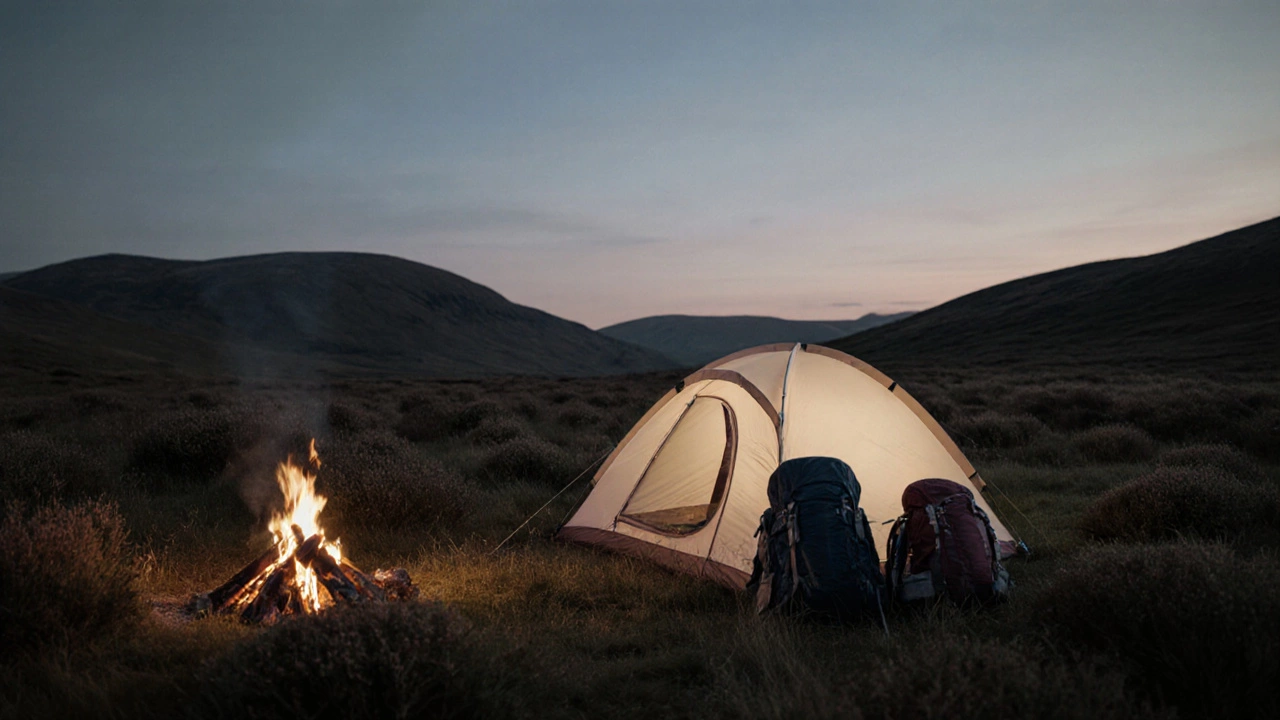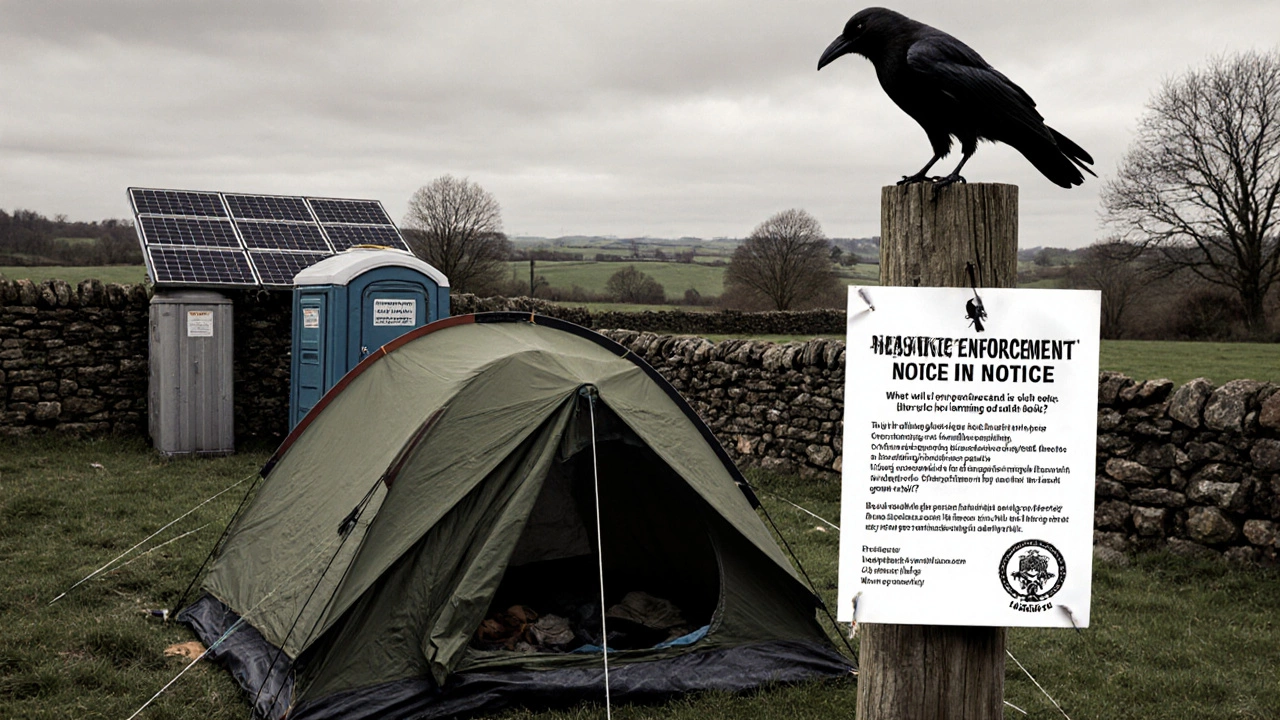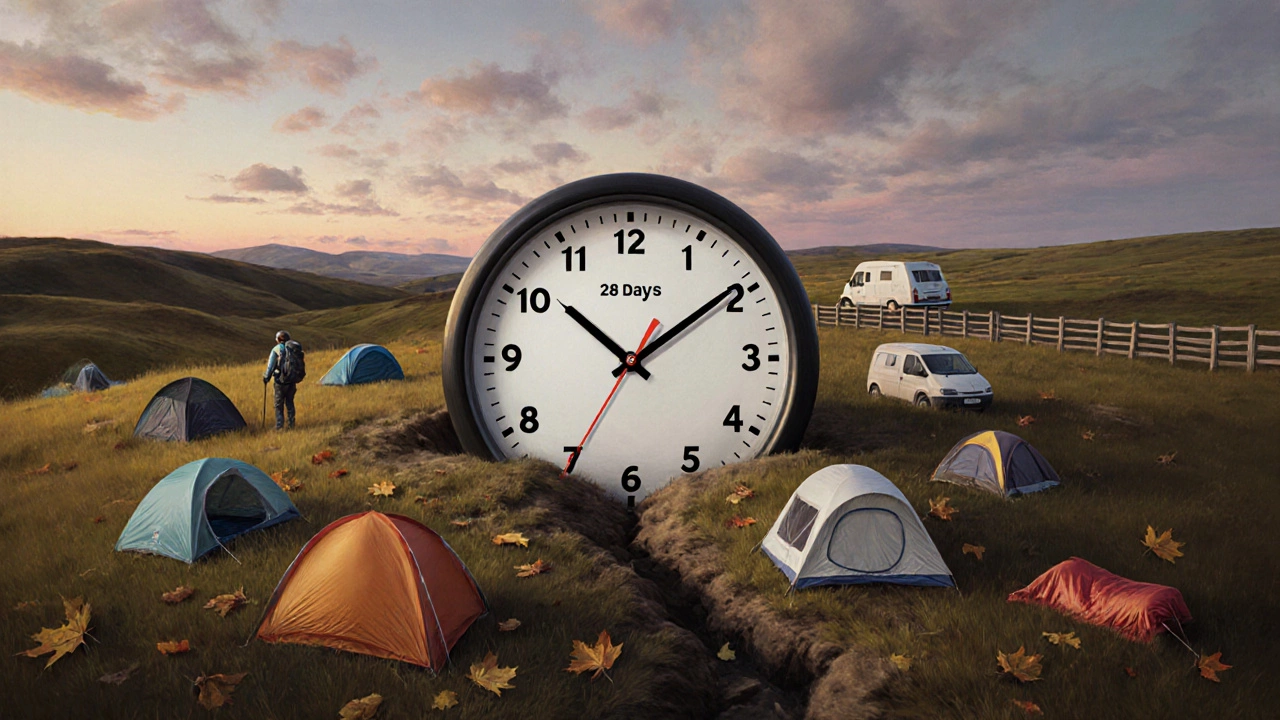How Long Can You Camp on Your Own Land in the UK Without Permission?
 Nov, 17 2025
Nov, 17 2025
UK Land Camping Day Calculator
How It Works
This calculator tracks your camping days on your own land to ensure compliance with UK planning law. Remember:
- Maximum 28 days total in any 12-month period
- Includes tents, caravans, and temporary structures used for sleeping
- Applies regardless of whether you charge for camping
- Does not apply to public land or Scotland's right to roam
Your Camping Status
28 days remaining this year
What Counts as Camping
The law counts:
- Tents, hammocks, and temporary shelters
- Caravans or mobile homes used for sleeping
- Small structures like pop-up tents or shelters
It does not count:
- Day trips without overnight stays
- Short-term stays under 3 days
- Non-residential structures like storage sheds
You own a patch of land in the Scottish Highlands, a quiet corner of Wales, or a quiet field in the Lake District. You want to pitch a tent, light a small fire, and sleep under the stars. But how long can you actually stay? Is it legal? And what happens if your neighbor complains?
The short answer: in most of the UK, you cannot camp on your own land without permission for more than 28 days in a calendar year - even if it’s yours. This rule isn’t about ownership. It’s about planning law. And it catches most people off guard.
Why Ownership Doesn’t Mean You Can Camp Forever
Many assume that if you own the land, you can do whatever you want on it. That’s not true in the UK. Land ownership gives you rights to use, sell, or build on the property - but not unlimited freedom to use it for temporary activities like camping. The law treats long-term camping as a change of use of the land.
Under the Town and Country Planning Act 1990, any land use that’s not its original, permitted purpose requires planning permission. If your land is zoned for agriculture or just as open land, setting up a tent for more than 28 days in a year is considered a temporary change to recreational or residential use. That triggers the need for approval.
This rule applies whether you’re on your own land, a friend’s land, or even land you’ve rented. The key factor isn’t ownership - it’s duration and intent.
The 28-Day Rule Explained
The 28-day limit isn’t a suggestion. It’s written into UK planning regulations. You can camp on your land for up to 28 days total in any 12-month period. That doesn’t mean 28 consecutive days - it means 28 days total, spread out however you like. You could camp for 7 days in April, 5 in June, 10 in August, and 6 in October. That’s your full allowance.
Once you hit 29 days, you’re in breach. Local councils can issue enforcement notices. That means you could be forced to remove your tent, pay fines, or even be required to restore the land to its original condition.
There’s no official “camping license” you can apply for to extend this. The 28-day window is the only legal buffer. Even if you’re not charging anyone or causing noise, the rule still applies.
What Counts as Camping?
Not every night under the stars triggers the rule. The law looks at intent and structure. If you’re sleeping in a tent, hammock, or caravan for more than a few nights in a row, it’s considered camping.
But here’s the gray area: if you’re using a small pop-up tent for a weekend every month, and you pack up and leave, most councils won’t care - as long as you stay under 28 days. But if you leave a tent up for months, add a tarp, a portable toilet, or solar panels, you’re moving into “residential use” territory. That’s when enforcement becomes likely.
Some landowners try to avoid the rule by calling their setup a “garden shed” or “outbuilding.” But if it’s being used for sleeping, eating, and living - not storage - the council will see through it. Planning officers don’t care what you call it. They care what it’s used for.
Scotland Is Different - But Not for Your Own Land
Scotland has the right to roam under the Land Reform (Scotland) Act 2003. That means you can camp wild on most unenclosed land - forests, moors, hills - as long as you follow the Scottish Outdoor Access Code. But that right doesn’t extend to your own land if you’re camping long-term.
Even in Scotland, the 28-day rule still applies to your property. You can’t use your backyard as a permanent wild campsite just because you’re allowed to camp on public land nearby. The law treats private land differently. The right to roam is for public access - not for bypassing planning rules on your own plot.

What Happens If You Go Over 28 Days?
Most councils won’t come knocking on day 29. They’re busy. But if someone reports you - a neighbor, a council inspector, or even a concerned hiker - they’ll investigate.
Enforcement starts with a warning letter. If you ignore it, you get an enforcement notice. That gives you 28 days to remove your camping setup. If you don’t comply, the council can enter your land, remove the equipment, and charge you for the cost. Fines can reach £5,000.
One real case in Devon involved a couple who camped for 11 months on their own land. They had a tent, a compost toilet, and solar lights. A neighbor complained. The council issued an enforcement notice. They had to remove everything. The couple spent over £2,000 on legal fees trying to fight it - and lost.
How to Legally Extend Your Stay
If you want to camp longer than 28 days, you have two real options:
- Apply for temporary planning permission - This is called a “change of use” application. You can ask your local council for permission to use your land for camping for up to 90 days a year. It costs around £200-£500, depending on the area. Approval isn’t guaranteed. You’ll need to prove no noise, no pollution, no impact on wildlife, and no access issues.
- Apply for permanent permission - If you want to turn your land into a private campsite, you need full planning permission. This is expensive, complex, and often denied unless you’re in a rural area with high demand. You’ll need a waste management plan, water supply, fire safety, and accessibility standards. Most individuals never go this route.
There’s no shortcut. No loophole. No “if I’m not charging, it’s fine” rule. The law doesn’t care if you’re doing it for free.
What About Caravans or Tiny Homes?
Many people think moving into a caravan or tiny house on their land is a way around the camping rule. It’s not. A static caravan or mobile home is treated as a building. If it’s sited on land for more than 28 days, it’s considered a permanent structure - and needs full planning permission.
Even if it’s on wheels, if it’s used for sleeping and living, the council will classify it as a dwelling. That means you need planning permission for the structure itself, plus permission for the land use. Most applications for residential use on agricultural land are rejected.
One landowner in Cornwall tried to live in a converted van on his field for 18 months. He claimed it was “mobile.” The council sent a notice saying his van was a “residential unit” and ordered its removal. He appealed. The tribunal ruled against him. The van was towed away.

What You Can Do Legally Right Now
Here’s what works without breaking the law:
- Use your 28 days - plan them wisely. Spread them out across seasons.
- Use your land for day trips - picnic, hike, read, relax - without sleeping overnight. That doesn’t count as camping.
- Use a small, lightweight tent for one or two nights at a time. Don’t leave gear up for weeks.
- Keep it low-key. No permanent fixtures, no electricity hookups, no toilets.
- Don’t advertise it. If you post about your “private campsite” on social media, you’re inviting attention.
Some landowners host friends for short stays - a weekend here, a week there. That’s fine, as long as it doesn’t add up to more than 28 days. And as long as you’re not treating it like a business.
What About National Parks and Protected Areas?
Even in national parks like the Peak District or Snowdonia, the 28-day rule still applies to private land. The park’s rules don’t override planning law. In fact, councils in these areas are often stricter because they’re trying to protect the landscape.
Some national parks have special guidelines for landowners who want to allow wild camping. But again - that’s for public access, not for private long-term use. You can’t turn your private field into a “wild camping zone” just because you’re in a national park.
What If You’re a Landowner With a Farm?
Farmers sometimes use their land for recreational camping as a side income. That’s allowed under Permitted Development Rights - but only if:
- The land is used for agriculture as its main purpose
- The camping is seasonal (May-September)
- It’s for no more than 28 days a year
- There are no permanent structures
- No fees are charged
If you charge even £5 per night, you’re now running a business. That requires full planning permission. Many farmers have been fined for letting people camp for £10 a night without permission.
Final Reality Check
If you’re dreaming of living off-grid on your own land - sleeping under the stars, growing your food, living simply - you’re not alone. But the UK’s planning laws aren’t built for that lifestyle. They’re built for control, safety, and protecting the countryside from unregulated development.
There’s no magic way around the 28-day rule. You can’t outsmart it. You can’t hide it. And if you push it, you’ll lose.
Your best move? Respect the limit. Use your 28 days. Enjoy the quiet. And if you want more - look into buying land in a country with more flexible rules. Or consider joining a land co-op that already has planning permission for camping.
Wild camping on public land is beautiful. But your own land isn’t a free pass. It’s a privilege - with a very clear clock ticking.
Can I camp on my own land in the UK if I don’t charge anyone?
Yes, but only for up to 28 days total in a calendar year. Whether you charge money or not doesn’t change the law. The issue is how the land is being used - not whether you’re making a profit.
Is it legal to live in a tent on my land permanently?
No. Living in a tent for more than 28 days in a year is considered a change of land use and requires planning permission. Permanent tent living is treated as residential occupation, which is not allowed without approval.
What if I move my tent every few days to stay under 28 days?
As long as you’re not staying more than 28 days total in a year, it’s legal. But if you’re rotating between spots on your own land and leaving gear behind, councils may still see it as continuous use. Keep it clean, light, and temporary to avoid trouble.
Can I put up a tiny house on wheels on my land?
No, not legally without planning permission. Even if it’s on wheels, if it’s used for sleeping and living, the council will classify it as a dwelling. That requires full planning approval, which is rarely granted on non-residential land.
Do the rules change in Scotland or Wales?
No. While Scotland allows wild camping on public land, the 28-day limit for private land still applies. Wales follows the same planning laws as England. Ownership doesn’t override national planning regulations.
What if I’ve been camping for months and no one has said anything?
Just because no one has complained doesn’t mean you’re legal. Councils often act only after a report. Neighbors, hikers, or environmental officers can report you at any time. If you’re over the limit, you’re still in breach - and could face enforcement later.
Can I camp on my land if I’m a landowner with a disability?
Disability doesn’t override planning law. You still need to follow the 28-day rule. However, you can apply for planning permission with reasonable adjustments in mind. Some councils may be more flexible if you can prove the camping is essential for your wellbeing - but approval isn’t guaranteed.
Are there any exceptions for conservation or eco-projects?
Not really. Even if you’re doing ecological research or sustainable living, you still need planning permission for long-term camping. Some councils may support your project, but they can’t ignore the law. You’ll still need to apply formally.